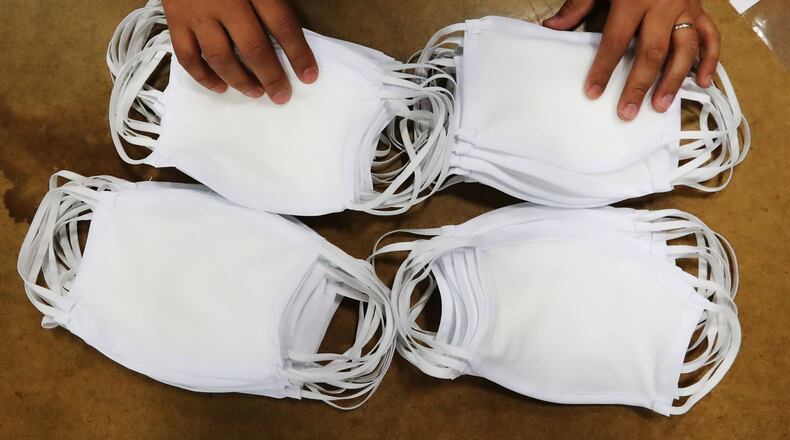Owners of hair salons have been thrown into the competition with hospitals for protective face masks.
Georgia allowed salons that it ordered closed because of the coronavirus to reopen Friday if they meet new standards for cleaning, practices and equipment. A key one for salons: masks must be used by the hair stylists and should be used "to the extent possible" by customers.
Once found without problem on shelves of hardware stores, pharmacies and even aisles of some grocery stores, masks became as rare as winning lottery scratch-offs after demand exploded. Recently the Centers for Disease Control and Prevention recommended anyone out and about wear one, not just health care workers.
A survey of a dozen metro Atlanta retailers such as hardware and paint stores by a reporter Thursday found only one that had some on the shelves.
Some salons are easing back into the business, concerned about health dangers for workers and customers. Others say they are ready to cut, curl and color.
“I intend to open up on Friday,” said Kay Kendrick, owner of Cut & Style salon in Thomson, east of Atlanta, and also the chair of the Georgia State Board of Cosmetology and Barbers.
She had industrially manufactured masks on hand already — some stylists and manicurists used them before the pandemic. And if a customer doesn’t have an industrially manufactured mask, they can make one from cloth, or even rig one from a bandana and elastic hair bands, she said.
Many public health experts have warned against businesses opening to soon, but Kendrick said women in Thomson lined up behind her decision by booking her chair solidly through the weekend.
“Some of us have been out of work for five weeks and longer,” she said. And because most are independent contractors, getting unemployment payments has been delayed.
She said she can get her salon up to the new safety standards put forward by the state and the cosmetology board. Those include sanitizing work spaces, optional temperature checks of customers and workers, and social distancing of six feet between customers or work stations. But, of course, personal distancing will be impossible for a hairdresser whose job requires him or her to hover over a customer's head.
That concerns Allison McTigue, owner of Allison McTigue Salon in Buckhead. She and her other workers are nervous about getting or helping spread COVID-19.
“I am not going to have my clients be a guinea pig,” McTigue said.
McTigue was hoping to reopen by the middle of May. But after Monday’s announcement allowing salons to resume operations, she ordered masks and other recommended equipment such as face shields from online sellers, despite knowing that some buyers have been scammed.
“I don’t have any money coming in, but I just spent $900 on face shields. I just spent $430 on 1,000 masks,” she said. “Hopefully they are going to show up.”
Mask makers are working overtime and adding production around the world. Canada’s Medicom moved its Augusta, Ga., manufacturing plant to 7-day production and added shifts while building a new plant in Montreal. Minnesota-based 3M has doubled production of it N95 respirator masks to 1.1 billion per year and will increase capacity to 2 billion in a year.
But it could take weeks or months for supply to meet demand.
“They are hard to find, but I have ordered the KN95 masks direct from suppliers in China four weeks ago,” said Allen Smith, who owns three ACE hardware stores in north metro Atlanta.
Quick-thinking Atlanta companies have ginned up new business by sewing cloth masks, which don’t meet medical standards but are useful for helping prevent the spread of the virus, according to health experts.
Georgia Expo, a company that makes curtains and equipment for trade shows, saw its business shrivel with the arrival of the virus, but pivoted its seamstresses to making masks. It hired 17 new workers this week, will hire 30 next week and is retraining other workers to sew.
“We went from one shift to two and are adding a third shift next week,” said Amanda Gray, a company vice president.
“So, last week we did 30,000 masks, this week we will do over 50,000, next week 80,000 and the week after that, it will be over 100,000,” she said. The company is selling the masks to distributors who resell them to retailers.
“We are thinking this will definitely go through the summer,” Gray said.
“But I hope there’s not a need to be making them in the fall.”
About the Author
Keep Reading
The Latest
Featured



